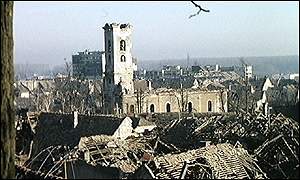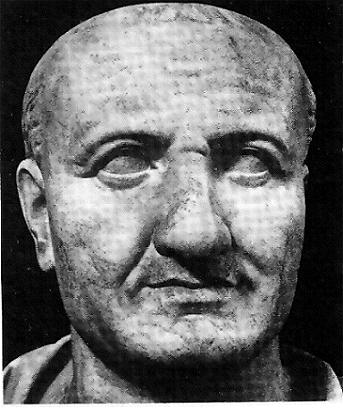It Seems Like Nothing
Week of Monday November 8, 2004
Lectionary Readings (Revised Common Lectionary, Year C)
Haggai 1:15–2:9
Psalm 145:1–5, 17–21 or Psalm 98 or Job 19:23–27
Psalm 17:1–9
2 Thessalonians 2:1–5, 13–17
Luke 20:27–38
 |
Vukovar, Croatia, June 1991 |
I am amazed when I consider how much of the Holy Bible is about human warfare. The entire book of Joshua, for example, tells the story of Israel's violent military campaign against the Canaanites and the subsequent redistribution of land they had conquered. Our lectionary text from Haggai this week finds Israel adrift in the geo-political rip tides created by the fall of Babylon and the rise of Persia to world power. At this juncture in Hebrew history she was an insignificant pawn of the power brokers of the day.
Jews had lived in Babylonian exile for about fifty years when on October 13, 539 BC, Cyrus the Great of Persia, who ruled from 550–530 BC, conquered Babylon at the Battle of Opis on the Tigris River. This pagan Cyrus issued a decree in 536 BC that allowed Jews to return to Jerusalem. Some of them did return, but truth be told life was probably better in Babylon. The good news, of course, was the possibility of repatriation; the bad and bitter news was what they found when they did, in fact, return to Jerusalem. Who wanted to return to the scene of national destruction?
 |
Roman Emperor Vespasian (AD 69–79) |
One of my worst habits in reading the Bible is to moralize, spiritualize and romanticize. But I have been to a city destroyed by war (Vukovar, Croatia) and I remember what I saw, what I smelled and what I felt: mass graves, buildings with trees growing out of what used to be living rooms, mundane household appliances in bizarre places (a rusted washing machine in a front yard), buildings pock-marked from bullets, smoldering rubbish, disrupted schools, a municipal water tower that looked like swiss cheese and that tottered askew, shrapnel everywhere (a handful of which is now on my office bookshelf), warning signs of land mines, massive unemployment from a destroyed economy, and in the community deep distrust, ethnic strife, nationalistic revenge, and conspiracy theories. I suspect that when the Jews left Babylon and returned to what had once been their homes and homeland in Jerusalem, they experienced the emotional equivalent of what I experienced in Vukovar.
It is no wonder, then, that even though the Jews began to restore their ravaged temple in 534 BC, for a host of reasons the effort petered out and reconstruction ground to a halt. Perhaps the tragedy, loss and catastrophy of war was too overwhelming. Maybe bitterness, resignation and dejection laid to waste good intentions. Or maybe more mundane matters like limited skilled labor, imperfect conditions, insufficient building materials and budgets stymied progress. A generation had grown up in Babylon who knew nothing of the former splendor of Solomon's temple. In fact, their exilic experience of Judaism was with no temple at all. For fourteen years, not until a subsequent Persian King, Darius (521–485 BC), reissued the rebuilding edict, did work begin again. This "second temple," as it is called, was finished in the year 515 BC. To be sure, that was a victory of sorts, but it took almost a full generation, twenty years. This second temple was enlarged and expanded by King Herod in 20 BC, but then destroyed by the Romans in the revolt of the Jews against Rome in 66–70 AD. The Romans built their own temple on the site, and today it is occupied by a Muslim Shrine called the Dome of the Rock.
A few people were still living then who could compare the second temple with Solomon's temple; the verdict was inevitable and predictable: "Who of you is left who saw this house in its former glory? How does it look to you now? Does it not seem to you like nothing?" (Haggai 2:3). By Solomonic standards the second temple was a meager, pale imitation, and everyone knew it. That much was true.
But it was also true that Yahweh was every bit as present in the modest second temple under the Persian ruler Darius as He was in the extravagant temple under King Solomon of Israel or, for that matter, under the regime of King Nebuchadnezzar in Babylon when there was no temple at all. The repatriated exiles had to start over. They had to revise their expectations downward. They had to accept their modest circumstances with brutal realism even as they worked hard to overcome them. Most important of all, they also had to maintain their confidence in the word that God spoke to them through Haggai: "Be strong, all you people of the land, and work. For I am with you," declares the Lord Almighty. "This is what I covenanted with you when you came out of Egypt. My Spirit remains among you. Do not fear."
 |
Persian king Darius (521–485 BC) |
One Saturday morning I was running along Portola Road on my weekly long run, my running cap pulled down so that I could only see four or five feet in front of me. As I ran alongside the road I came across a single, brilliant yellow California poppy bursting out of the concrete gutter. How could such brilliant life emerge, isolated and fragile, from the broken glass, road grunge, rocks and beer cans of the gutter? I don't know, but it did, and irrepressibly so. That, in a sense, is what the brave, repatriated Jews who returned to Jerusalem did. Out of death and destruction they willed new life, however modestly it compared to outward, architectural standards of former glory.
Most people who live a normal life experience their fair share of reversal, exile, defeat, destruction, and catastrophy. Some times enemies do this to us. Other times we do it to ourselves. Very often there is no reason at all. Our health, our checkbooks, our jobs and families all include some amount of battle, whether a slight skirmish or wholesale devastation. Right now I think of my aging mother whose health is failing, a friend who fainted at work, a church acquaintance who has been in a coma for over a month, a colleague who is getting a divorce, a teenage marriage that feels good but premature, and high school kids we know who got involved in a drunken slugfest and likely face the wrath of the law. The outward circumstances of our lives can at times feel harsh beyond measure: "does it not seem like nothing?" Still, God speaks to us today through Haggai's ancient promise: "I am with you, do not fear, My Spirit remains among you."
When I almost ran over that California poppy sprouting from the gutter, my mind went to a favorite poem by the Welsh poet-physician Henry Vaughan (1621–1695) entitled "Revival."
Unfold! Unfold! Take in His light,
Who makes thy cares more short than night.
The joys which with His day-star rise
He deals to all but drowsy eyes;
And, what the men of this world miss
Some drops and dews of future bliss.Hark! How His winds have chang’d their note!
And with warm whispers call thee out;
The frosts are past, the storms are gone,
And backward life at last comes on.
The lofty groves in express joys
Reply unto the turtle’s voice;
And here in dust and dirt, O here
The lilies of His love appear!
Vaughan reminds us that winter winds give way to warm, spring breezes, that even, or perhaps especially, in the dust and dirt of our lives, God's loving presence emerges.





